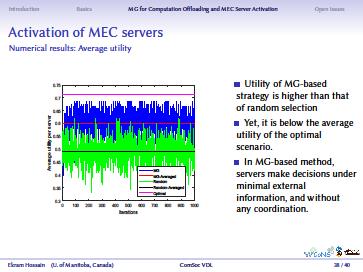IEEE COMSOC VIRTUAL LECTURE–10220–MOBILE EDGE COMPUTING
| January 5, 2021 | Posted by Frank Gomez under General |
Comments off
|
Report on the IEEE COMSOC Distinguished Lecturer VIRTUAL presentation given on October 20, 2020
“Computation Offloading and Activation of Mobile Edge Computing Servers: Minority Game Model”
By Dr. Ekram Hossain, University of Manitoba, Canada
This interesting presentation explored the utilization of Mobile Edge Computing. Professor Ekram Hossain started his explanation referring to several independent college students, all over the age of 21 years presumably, wanting to go out to the college town favorite bar. However, each only wanted to go out if that bar was less than 60% occupied.
To explain the concept in a different way, in terms that should be descriptive for an IEEE COMSOC engineer, consider a situation where a number of mobile 5G wireless users that are part of a series of small cell networks. Each has gathered some data from their mobile device sensors, and wants to do some computations with the parameters obtained. We presume that the each mobile device is unable to do these computations (which could be of a machine learning or artificial intelligence type). This may be due to the time allotment and CPU allocation simple needs of doing other tasks with the mobile device or a desire to save mobile battery power, etc, The information could be sent to a distant cloud (if latency were not an issue). It could be sent to a base-station that can gather the different parameter information from a set of mobile users. It is assumed that all the mobile users want some processing help; most possibly for different processing algorithms. For this problem, the base station is considered a local edge of the cloud. Each user wants his / her job done quickly and efficiency. Hence the terminology assigned here of Mobile Edge (of the main clouds) Computing.
The emphasis of this presentation was to explore the mathematical concepts of minority games; in particular, non-cooperative game theory. The problem is that of dynamic resource allocation. Each mobile device wants to have its processing done by the MEC station within some time for completion, The system constraint is that this off-loaded work imterctswith a fixed number in total of MEW processors (CPUs). There are some other general constraints (which were not clearly specified). Note that each mobile unit is assumed to have no communication capability with any other mobile unit. There is no cooperative planning. In addition, there is no ordering of requests or scheduling by a base-station cloud. (This was stated as not preferable due to required central site signaling overhead to and from each mobile user.)
Begin the game for each mobile user. Consider a strategy. That is, make a binary choice for what action your mobile device will take when each specified input–to-the-MEC epoch occurs. Transcribe it to your line-up / scorecard. The other mobile devices are considered as distinct players in this game. Each will have a different strategy. (Assume randomness; no mobile user has the identical strategy.) Assume that the number of MEC processors is fixed during these trails. Then at each possible transmission interval to the MEW, there may (success) or may not (failure) be a CPU processer available. Run a thousand iterations, and tally a score for success for your processing completion. (We are skipping all the charts of mathematics in this report.)
The results of these non-cooperative games are shown in the following Figure. The wording on this summary chart describes the results.

As for the future study plans of Professor Ekram Hossain, they include extending these Minority Games (MG)-Mobile Edge Computing (MEC) to consider classes of heterogeneous users (look past smart mobile phones to include tablets and laptops, for example). This could include developing stochastic models for the signal / data processing between the user’s device and the base-station-entry to the edge computing processor.
In this regard, we would propose starting from the capability of the currently being developed 5G chip sets (for example, Qualcomm Snapdragon 5G sets with their core memory). We note that this would be a challenging problem. Since these stochastic model results could directly affect the performance of the 5G system, we in the IEEE Foothill COMSOC Chapter would be directly interested in hearing Professor Ekram Hossain’s such advanced results.
Our thanks to Professor Ekram Hossain for an interesting briefing on game models in MG-MEW.
&&&&&&&&&&&&&&&&&&&&&&&&&&&&&&&&&&&&&&&&&&&&&